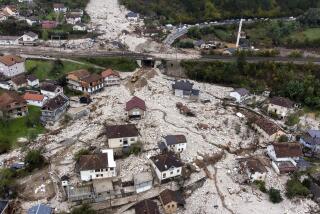Croatia Mobilizing to Battle Serbian Forces : Balkans: But the republic’s president meets with Yugoslav officials to seek a civil war reprieve.
- Share via
VIENNA — The Croatian government ordered a massive mobilization Tuesday to recover territory and pride lost in battles with rival Serbia, while the renegade republic’s president met with Yugoslav military officials to seek another reprieve in the escalating civil war.
The meeting on the island of Brioni among Croatian President Franjo Tudjman and the federal defense minister and army chief of staff appeared to be a move to buy time before what both sides expect to be a major clash that could exact thousands of casualties.
But the British Broadcasting Corp. early today reported that Tudjman and Yugoslav Defense Minister Veljko Kadijevic and Chief of Staff Blagoje Adzic had agreed to a cease-fire. Details of the agreement were not immediately available.
Fighting between Serbs and Croats has already killed at least 300 people since Croatia and neighboring Slovenia announced on June 25 that they were pulling out of the Yugoslav federation. Some reports have put the death toll at more than 500.
Croatia has also lost nearly a fifth of its territory to militant Serbs fighting the independence drive that would sever them from Serbia.
No Western government has formally recognized the sovereignty of Slovenia or Croatia. But foreign support for the Balkan breakaway republics has strengthened in recent days after intensified attacks by the Serbian rebels and units of the Yugoslav federal army.
Austria has promised to work toward direct ties with the two republics, and Germany and Italy have threatened outright recognition of Slovenia and Croatia, if Serbia fails to halt its incursions into Croatia.
Croatian authorities announced Tuesday that they were putting the entire population on a war footing after land and air attacks by the Serbian-dominated federal army killed at least a dozen people in eastern Croatia on Monday.
All able-bodied men have been called to arms in preparation for a major confrontation, Deputy Prime Minister Mate Granic told reporters in the Croatian capital of Zagreb.
European Community diplomats decided in Brussels on Tuesday to establish formal ties with the three Baltic republics now bound within the Soviet Union. Slovenia and Croatia see recognition of the Baltics as a boost for their own cause, but Western Europe and other foreign countries have been reluctant to take decisive action in the Yugoslav crisis.
“Without some dramatic happening from the European Community, we cannot avoid a major clash between the army and the Croatian people,” Nobilo said. “That might escalate, particularly in Bosnia. If that happens, God help us all.”
Bosnia-Herzegovina is a multiethnic republic that lies between Serbia and Croatia. Its population of Muslims, Serbs and Croats is so mixed that any effort to carve out territory for either of the warring republics would likely result in a blood bath with the Muslims.
Fighting has been reported in Bosnia-Herzegovina over the past two days between Serbs and Croats in regions bordering Croatia.
Radio Zagreb said the army-backed Serbian rebels on Tuesday continued to bombard Vukovar, a city of 50,000 in eastern Croatia that is populated by roughly equal numbers of Serbs and Croats. Other Croatian media reported federal army movements near the city of Osijek and in Bosnia-Herzegovina.
The military movements appeared to be aimed at a Serbian takeover of the few key areas still controlled by Croats in the regions of Croatia in which ethnic Serbs make up a significant part of the population.
Many of the 600,000 ethnic Serbs who live in Croatia, Yugoslavia’s second-largest republic with 5 million people, are fighting Croatian independence out of fear that they could suffer the same barbaric reprisals meted out by the fascist leaders of the last independent Croatian state--the Nazi puppet regime that seized control in 1941. Hundreds of thousands of Serbs, Jews and Gypsies were executed by the Croatian Ustasha government before Communist-led partisans emerged victorious at the end of World War II.
The Zagreb leadership claims that the Serbian attacks are simply a land grab that will result in a “greater Serbia” being formed from the ruins of the Yugoslav federation.
In a comment from the Vatican on Tuesday, Pope John Paul II appealed for an end to the conflict, saying that “the news that continues to come from Croatia is ever more worrying, raising fears of an imminent generalized civil war.”
Times special correspondent Danica Kirka also contributed to this story from Zagreb.
More to Read
Sign up for Essential California
The most important California stories and recommendations in your inbox every morning.
You may occasionally receive promotional content from the Los Angeles Times.











